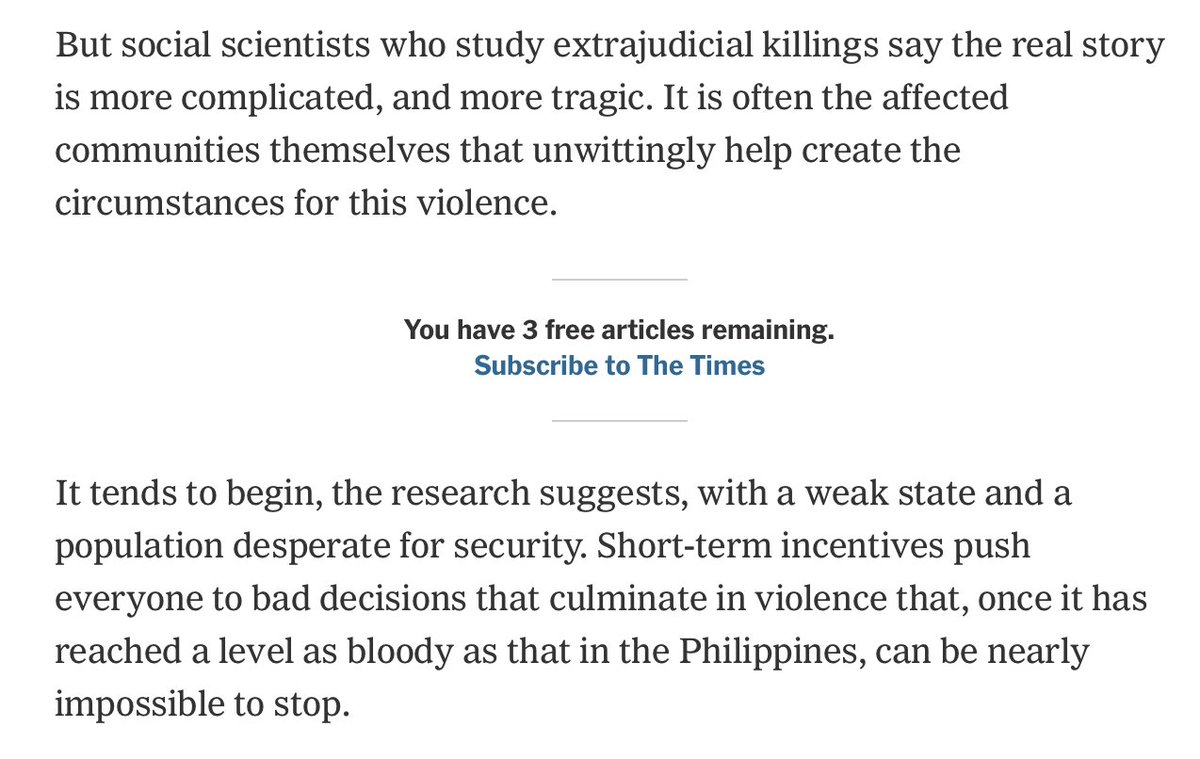Jacobtldr's Categories
Jacobtldr's Authors
Latest Saves
This is a question I ask in my latest article in Theory & Society, “Boundary-work and the demarcation of civil from uncivil protest in the United States: control, legitimacy, and political inequality” (https://t.co/EFMY6Q5hLd) 2/
In the article, I develop the concept of *civility contests*—everyday efforts to distinguish between civil and uncivil individuals, groups, or behaviors. 3/
Focusing on political protest in the US, I find that civility contests involve a wide range of political actors (power holders, opposing movements, the media) who seek to *control* or *delegitimize* protesters (or defend protesters’ *legitimacy*). 4/
When powerholders or political rivals question protesters’ civility, this is a way of changing the subject. Civility contests suck the air and energy out of protests, leaving less room for substantive debate. They also justify sometimes severe punitive action. 5/
A very nice piece by @joshganshttps://t.co/0nUPKGeeMG
— Paul Romer (@paulmromer) October 8, 2018
Market forces lead to suboptimal investments in health and education, especially social determinants of health and early learning. (Invest early, invest often for biggest rerurns.) /3
Public policy can provide the "monopolistic" investment that optimizes (at least improves) productive potential of every person in society, not discounting the potential of the poors and the marginalized. /4
This is exactly what we are going to need more of in the next few years, as the Global North ages rapidly and we are faced with dependency ratios that look like the 1960s, but with half the growth. That working are population will need all hands on deck. /5
In short, after a lifetime of being told that markets can do the job if you just get out of the way, we are entering an era where we will need more public policy interventions to optimize growth and well being./6
2. Trump and the GOP just appointed Brian Benczkowski, a lawyer who worked for Alfa Bank, to lead the DOJ's criminal division, and he refuses to recuse himself.
What the hell is going on here?
Dexter Filkins does a meticulous job revisiting the Trump/Alfa Bank server connection--and lands at about the same conclusion I did a few years back: This wasn't random. https://t.co/YTy6HJyO4d
— Franklin Foer (@FranklinFoer) October 8, 2018
By the time I introduced Donald Trump to the Egyptian president in September 2016, a politically motivated surveillance operation by at least the UK and Australia was targeted at me and the campaign for seven months. Who authorized that? Congress has the answers.
— George Papadopoulos (@GeorgePapa19) October 7, 2018
2/ Trump's legal duty under the federal aiding and abetting statute not to do anything that might induce further Russian attacks was officially triggered on August 17, 2016, at his first classified briefing. Why was he meeting with a "Kremlin intermediary" weeks after this date?
Looking forward to watching @SethAbramson\u2019s world collapse around him when he realizes he has been absolutely wrong about his apparent \u201cinsight\u201d since day 1. I repeat, trust the insiders, not the nuts.
— George Papadopoulos (@GeorgePapa19) October 8, 2018
2/ As GP rails against Mueller to help sell movie rights to his story (or whatever), here's what his attorneys actually said in court: "Our firm would in a second stand up if we saw prosecutorial or governmental misconduct. We have seen no such thing." But they didn't stop there.
3/ George's attorneys added, "We have seen no entrapment. We have seen no set-up by U.S. intelligence people. Everything we saw, they’ve been on the square." So apparently on the same day my world "collapses," George's lawyers will *also* experience a massive temporal distortion.
For past 3 yrs, I’ve been working on a project that’s required me to study lynch mobs in Brazil
To call rate of lynchings here a problem is an understatement
& I think it correlates w ppl’s thirst for a law & order strongman like Bolsonaro
1/13
The rise of @jairbolsonaro was predictable.
— Brian Winter (@BrazilBrian) October 6, 2018
Brazilians have been craving "law & order" for years, but their democratic leaders largely ignored them. I started writing about this in Nov 2015, after I was caught in a fatal shootout in the Amazon 1/?
Back in 2016 I crawled the news for reports of lynchings across Brazil
What I found: 180 deaths — 180 people killed by an angry crowd
That’s 1 every 2 days
I wrote about that in the article linked below (keep in mind: the year hadn’t ended
Experts all told me same thing: vigilante justice is a byproduct of people’s belief that the state does not fight crime effectively
This is true everywhere
Consider the Philippines, which had elected strongman Duterte: https://t.co/2rJLGd2vwy
3/13
https://t.co/2rJLGd2vwy

So what about this last week before the elections in Brazil? Have there been any vigilante killings?
Let’s go back to last Saturday
4/13
In the early hours, a man recently released from prison was beaten to death by 4 others in the center of Brazil’s richest city, São Paulo
Killing took place in the middle of the street, on the doorstep of the country’s most prestigious
Worth noting that @Google is the only tech company that's a top-tier supporter of the Federalist Society.
— McVillain (@mcmillen) October 7, 2018
It's absolutely shameful, but unfortunately most employees don't care. pic.twitter.com/3PJNWevq1s
Facebook’s top sites are often hyper-partisan right-wing sites and also.. this. All the complaining you hear about “liberal bias” in Silicon Valley is just strategic playing the referees—who are pretty easy to play, apparently. H/t @kevinroose https://t.co/vpPZXzir7q

No that’s not the structure of my argument. Facebook and YouTube have been great for Breitbart and Trump for example—it’s that success that moved Fox closer to them. Tech platforms are biased towards the hyper-partisan and Breitbart plays that better.
Fox News is the most watched cable news, ergo cable is biased. @jayrosen_nyu is trying a similar argument.
— Alcofribas (@open_mix) October 7, 2018
by Sari Pekkala Kerr, William R. Kerr, Tina Xu
https://t.co/npWFbaYzn1
(big 5)
Still reading it, but… an important point would be how they (implicitly or explicitly) define
"Personality Traits of Entrepreneurs: A Review of Recent Literature"
— @reiver \u22bc (Charles Iliya Krempeaux) (@reiver) October 7, 2018
by Sari Pekkala Kerr, William R. Kerr, Tina Xuhttps://t.co/npWFbaYzn1
(big 5)
“Many studies consider the “traits of entrepreneurs” or the “traits that make entrepreneurs successful.” ”
What type of person tries to do entrepreneurial things versus What type of person succeeds after trying to do entrepreneurial
"Personality Traits of Entrepreneurs: A Review of Recent Literature"
— @reiver \u22bc (Charles Iliya Krempeaux) (@reiver) October 7, 2018
by Sari Pekkala Kerr, William R. Kerr, Tina Xuhttps://t.co/npWFbaYzn1
(big 5)
“We focus […] on […]: (1) the personality traits of entrepreneurs and how they compare to other groups; (2) the attitudes towards risk that entrepreneurs display; and (3) the overall goals and aspirations that entrepreneurs bring to their
"Personality Traits of Entrepreneurs: A Review of Recent Literature"
— @reiver \u22bc (Charles Iliya Krempeaux) (@reiver) October 7, 2018
by Sari Pekkala Kerr, William R. Kerr, Tina Xuhttps://t.co/npWFbaYzn1
(big 5)
“The bulk of recent literature seeks to answer two main questions: (1) Do certain traits predict an individual’s likelihood of becoming an entrepreneur, and (2) Do certain traits predict an entrepreneur’s likelihood of achieving “successful”
"Personality Traits of Entrepreneurs: A Review of Recent Literature"
— @reiver \u22bc (Charles Iliya Krempeaux) (@reiver) October 7, 2018
by Sari Pekkala Kerr, William R. Kerr, Tina Xuhttps://t.co/npWFbaYzn1
(big 5)
by Sari Pekkala Kerr, William R. Kerr, Tina Xu
https://t.co/npWFbaYzn1
(big 5)
Still reading it, but… an important point would be how they (implicitly or explicitly) define
"Personality Traits of Entrepreneurs: A Review of Recent Literature"
— @reiver \u22bc (Charles Iliya Krempeaux) (@reiver) October 7, 2018
by Sari Pekkala Kerr, William R. Kerr, Tina Xuhttps://t.co/npWFbaYzn1
(big 5)
“Many studies consider the “traits of entrepreneurs” or the “traits that make entrepreneurs successful.” ”
What type of person tries to do entrepreneurial things versus What type of person succeeds after trying to do entrepreneurial
"Personality Traits of Entrepreneurs: A Review of Recent Literature"
— @reiver \u22bc (Charles Iliya Krempeaux) (@reiver) October 7, 2018
by Sari Pekkala Kerr, William R. Kerr, Tina Xuhttps://t.co/npWFbaYzn1
(big 5)
“We focus […] on […]: (1) the personality traits of entrepreneurs and how they compare to other groups; (2) the attitudes towards risk that entrepreneurs display; and (3) the overall goals and aspirations that entrepreneurs bring to their
"Personality Traits of Entrepreneurs: A Review of Recent Literature"
— @reiver \u22bc (Charles Iliya Krempeaux) (@reiver) October 7, 2018
by Sari Pekkala Kerr, William R. Kerr, Tina Xuhttps://t.co/npWFbaYzn1
(big 5)
“The bulk of recent literature seeks to answer two main questions: (1) Do certain traits predict an individual’s likelihood of becoming an entrepreneur, and (2) Do certain traits predict an entrepreneur’s likelihood of achieving “successful”
"Personality Traits of Entrepreneurs: A Review of Recent Literature"
— @reiver \u22bc (Charles Iliya Krempeaux) (@reiver) October 7, 2018
by Sari Pekkala Kerr, William R. Kerr, Tina Xuhttps://t.co/npWFbaYzn1
(big 5)
Naturally 5,000 locals signed a petition against it because it might lower home values
There is a myth - often used by neighbors to thwart development - that affordable housing makes property values drop in the neighborhood. Study after study has disproved
This gif should be up on the projector screen at every neighborhood meeting about a new low-income housing project
https://t.co/Lb17kGl0iB




























